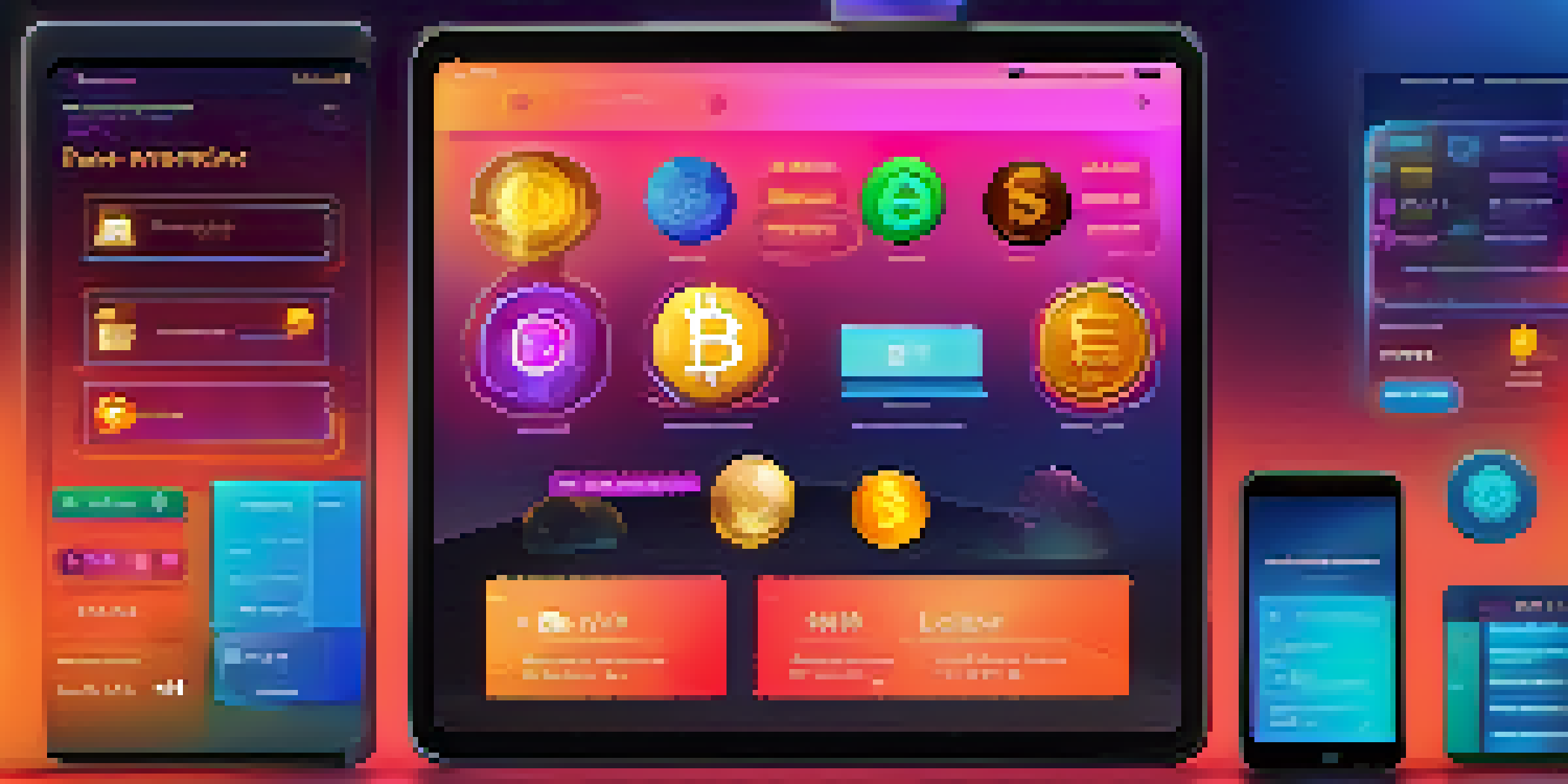How Token Standards Enhance User Experience on Ethereum

Understanding Ethereum Token Standards and Their Importance
Token standards are essential frameworks that define how tokens behave on the Ethereum blockchain. They ensure that tokens can be easily created, managed, and exchanged across various platforms and wallets. Without these standards, the Ethereum ecosystem would be chaotic, with tokens lacking consistency and compatibility.
Ethereum is a platform that allows developers to create applications that can work together, making it easier for users to interact with different services.
For instance, the most popular token standard, ERC-20, allows developers to create fungible tokens that can be traded like currency. This standardization is crucial for ensuring that different tokens can interact seamlessly within the Ethereum network. Think of it like a universal charger for your devices—without it, you'd be stuck with a jumble of incompatible gadgets.
In a nutshell, token standards not only streamline the technical aspects of token creation but also enhance overall user experience by ensuring that transactions are smooth and predictable.
How ERC-20 Tokens Simplify Transactions for Users
ERC-20 tokens have become the go-to standard for creating new tokens on Ethereum. Their widespread adoption means that most wallets and exchanges are designed to support these tokens, making it easy for users to buy, sell, and trade. Imagine walking into any coffee shop and being able to use the same gift card regardless of the brand—this is the kind of convenience ERC-20 brings to the crypto space.

Moreover, the ERC-20 standard has built-in functions that simplify transactions, such as transferring tokens and checking balances. This means users don’t have to navigate complex code or interfaces to manage their tokens. Instead, they can focus on trading or investing, making the entire process more user-friendly.
Token Standards Ensure Compatibility
Token standards like ERC-20 and ERC-721 provide essential frameworks that enable seamless interaction and exchange of tokens across the Ethereum ecosystem.
Ultimately, the simplicity and compatibility of ERC-20 tokens significantly enhance the experience for everyday users, empowering them to engage with the Ethereum ecosystem with confidence.
The Role of ERC-721 Tokens in Non-Fungible Assets
While ERC-20 tokens are all about fungibility, ERC-721 tokens introduce the concept of non-fungible assets—unique items that cannot be exchanged on a one-to-one basis. These tokens have revolutionized digital art and collectibles, allowing users to truly own unique pieces in the digital world. It's like owning a one-of-a-kind painting; no one else can possess that exact piece.
The beauty of Ethereum is in its ability to create a decentralized and interoperable network of applications, all built on the same token standards.
With ERC-721, each token has distinct attributes that set it apart from others, making it perfect for applications like digital art, gaming, and more. Users can easily verify ownership and provenance, which is crucial for collectors. This transparency builds trust and encourages participation in the growing market for non-fungible assets.
In essence, ERC-721 tokens enhance user experience by allowing for a richer, more diverse interaction with digital assets, paving the way for new forms of ownership and value.
Interoperability: A Key Benefit of Token Standards
One of the most significant advantages of Ethereum's token standards is interoperability—the ability for different tokens and applications to work together. This means users can easily switch between various platforms and services without having to worry about compatibility issues. Imagine being able to use your favorite loyalty points at any store without limitations; that’s the power of interoperability.
For example, users can trade ERC-20 tokens on various decentralized exchanges or use them in DeFi applications seamlessly. This flexibility enhances user experience by providing more options and opportunities for engagement within the Ethereum ecosystem. It encourages exploration and innovation, allowing users to discover new projects and services.
User-Friendly Wallets Simplify Access
The development of user-friendly wallets allows individuals to manage multiple token types effortlessly, making cryptocurrency more accessible to everyone.
In short, interoperability fosters a connected and cohesive user experience, making the Ethereum blockchain an exciting and versatile environment for both developers and users alike.
User-Friendly Wallets: Making Token Management Easy
The rise of token standards has led to the development of user-friendly wallets that simplify token management for everyday users. These wallets support multiple token standards, allowing users to store, send, and receive various tokens without needing technical expertise. Think of it as a digital wallet that holds all your cards, making transactions effortless.
Many wallets offer intuitive interfaces, enabling users to view their balances, transaction history, and even swap tokens with a few clicks. This ease of use is crucial for onboarding new users to the Ethereum ecosystem, as it reduces the intimidation factor often associated with cryptocurrency management. Everyone wants a straightforward way to handle their assets.
Ultimately, user-friendly wallets enhance the overall experience by making it accessible for everyone, from seasoned investors to those just dipping their toes into the crypto waters.
Smart Contracts: Enhancing Trust and Security
Smart contracts are self-executing contracts with the terms written into code, and they play a crucial role in enhancing user experience on Ethereum. By automating processes and eliminating the need for intermediaries, smart contracts provide users with a sense of security and trust in their transactions. It's like having a reliable referee in a game—everyone knows the rules and can trust that they will be enforced.
These contracts can facilitate everything from token swaps to decentralized finance (DeFi) lending, all while ensuring that funds are only released when specific conditions are met. This transparency reduces the risk of fraud and enhances user confidence in the platform. Users can engage in transactions knowing that the code will execute as intended, without the worry of human error.
Community Support Enhances Experience
A vibrant Ethereum community fosters collaboration and knowledge sharing, which significantly improves user experience and encourages deeper engagement with the platform.
In summary, smart contracts significantly improve user experience by offering a secure and trustworthy environment for conducting transactions within the Ethereum network.
Community and Support: Building a Strong Ecosystem
The Ethereum community is a vibrant ecosystem that continually supports and improves user experience through collaboration and innovation. Developers, users, and enthusiasts come together to share knowledge, troubleshoot issues, and create new applications that enhance the Ethereum experience. It’s akin to a neighborhood where everyone pitches in to make things better for all.
Many online forums, social media groups, and meetups exist to foster this sense of community, where users can ask questions and gain insights from others. This collaborative environment encourages users to engage more deeply with the platform, knowing that help is readily available. It’s reassuring to know you’re not navigating this complex world alone.

Ultimately, the strong community support surrounding Ethereum enhances user experience by making it easier for individuals to learn, grow, and build their own projects within the ecosystem.
Conclusion: The Future of User Experience on Ethereum
As Ethereum continues to evolve, the importance of token standards in enhancing user experience cannot be overstated. These standards lay the groundwork for a cohesive and accessible ecosystem, allowing users to engage with a wide array of tokens and applications. The future looks promising, with innovations on the horizon that will further streamline user interactions.
By prioritizing user experience through features like interoperability, user-friendly wallets, and robust community support, Ethereum is paving the way for mass adoption of blockchain technology. It’s exciting to think about the possibilities that lie ahead, as more people begin to understand and utilize these tools in their daily lives.
In conclusion, token standards are not just technical specifications; they are the backbone of a user-friendly experience on Ethereum, making blockchain technology accessible and enjoyable for everyone.